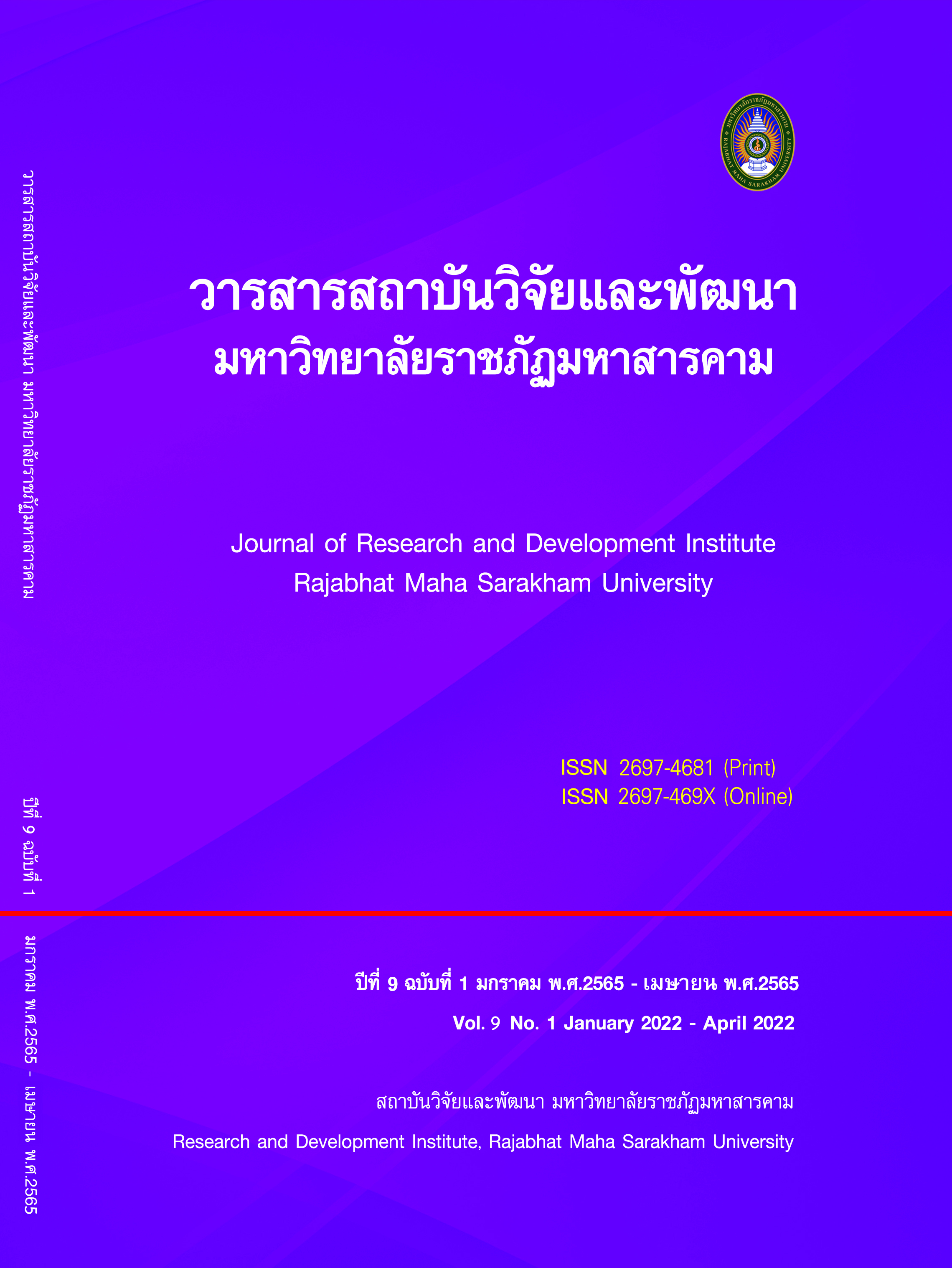รูปแบบการพัฒนาคุณภาพชีวิตผู้สูงอายุตามแนวพุทธศาสนา
คำสำคัญ:
รูปแบบ, คุณภาพชีวิตการทำงานของครูบทคัดย่อ
การวิจัยครั้งนี้มีวัตถุประสงค์เพื่อ 1) ศึกษาสภาพปัจจุบันและความต้องการพัฒนาคุณภาพชีวิตของผู้สูงอายุตามแนวพุทธศาสนาในเขตเทศบาลเมืองมหาสารคาม 2) สร้างรูปแบบการพัฒนาคุณภาพชีวิตของผู้สูงอายุตามแนวพุทธศาสนาในเขตเทศบาลเมืองมหาสารคาม 3) ทดลองใช้รูปแบบการพัฒนาคุณภาพชีวิตของผู้สูงอายุในเขตเทศบาลเมืองมหาสารคาม เป็นวิธีวิจัยและพัฒนา (R & D) การวิจัยแบ่งออกเป็น 3 ระยะ คือระยะที่ 1 ศึกษาสภาพปัจจุบันและความต้องการพัฒนาคุณภาพชีวิตตามแนวพุทธศาสนา กลุ่มตัวอย่างคือผู้สูงอายุในเขตเทศบาลเมืองมหาสารคาม ปี พ.ศ. 2562 จำนวน 360 คน โดยวิธีการสุ่มกลุ่มตัวอย่างแบบเป็นระบบ ระยะที่ 2 การสร้างรูปแบบการพัฒนาคุณภาพชีวิตของผู้สูงอายุ ประเมินรูปแบบโดยผู้เชี่ยวชาญจำนวน 9 คน ระยะที่ 3 การทดลองใช้รูปแบบการพัฒนาคุณภาพชีวิตของผู้สูงอายุ กลุ่มเป้าหมายเป็นผู้สูงอายุในเขตเทศบาลเมืองมหาสารคาม จำนวน 42 คน เครื่องมือที่ใช้ในการวิจัยประกอบด้วย แบบสอบถามสภาพปัจจุบันและความต้องการพัฒนา คำถามประจำแผนอบรม แบบประเมินการร่วมกิจกรรม แบบสัมภาษณ์ และแบบสอบถามวัดความพึงพอใจ สำหรับสถิติที่ใช้วิเคราะห์ข้อมูลประกอบด้วยค่าเฉลี่ย ( )
ค่าส่วนเบี่ยงเบนมาตรฐาน (S.D.) ค่าร้อยละ และค่าPNImodified การเสนอผลการวิจัยเป็นแบบตารางและพรรณนาวิเคราะห์
ผลการวิจัยพบว่า 1) ผลการศึกษาสภาพปัจจุบันและความต้องการพัฒนาคุณภาพชีวิตของผู้สูงอายุตามแนวพุทธศาสนาในเขตเทศบาลเมืองมหาสารคาม สภาพปัจจุบันโดยรวมอยู่ในระดับปานกลาง ส่วนความต้องการพัฒนาโดยรวมอยู่ในระดับมากที่สุด และได้ค่า PNImodified ระหว่าง 0.27 – 0.33 โดยรวมเท่ากับ 0.27 2) ผลการสร้างรูปแบบการพัฒนาคุณภาพชีวิตผู้สูงอายุตามแนวพุทธศาสนา พบว่ารูปแบบการพัฒนาคุณภาพชีวิตผู้สูงอายุตามแนวพุทธศาสนาประกอบด้วย 9องค์ประกอบ ได้แก่ 1) สาระสำคัญ 2) วัตุประสงค์การพัฒนา 3) สาระการพัฒนา 4) กิจกรรมการพัฒนา 5) สื่ออบรม 6) การวัดผลและประเมินผลการพัฒนา 7) ผลการพัฒนา 8) ปัญหาและอุปสรรค และ 9) ข้อเสนอแนะ และผลการประเมินรูปแบบการพัฒนาคุณภาพชีวิตผู้สูงอายุตามแนวพุทธศาสนา โดยผู้ทรงคุณวุฒิประเมินความเหมาะสมอยู่ในระดับมากที่สุด และความเป็นไปได้อยู่ในระดับมากที่สุด 3) ผลการทดลองใช้รูปแบบพบว่า มีระดับความพึงพอใจอยู่ในระดับมากที่สุด การประเมินรูปแบบการพัฒนาคุณภาพชีวิตผู้สูงอายุตามแนวพุทธศาสนาอยู่ในระดับดีมาก
เอกสารอ้างอิง
Boonraksa, A. (2011). Human Resource Development according to the 4th Prayer of the Provincial Headquarters, Royal Thai Army 31. Bangkok: Mahachulalongkornrajavidyalaya University.
Champawai, S. (2011). Developing a model of health promotion for the elderly with participation in the community. Maha Sarakham: Maha Sarakham University.
ChangMai, S. (2007). Thai society and the situation of the elderly at present and in the future. [Online]. http//:www.matichon.co.th [3 May 2021]
Chuanpee, S. (1997). Quality of Life Study of the Elderly, Bang Mueang Subdistrict, Samut Prakan Province. Bangkok: Srinakharinwirot University.
Jaisamran, U. (2010). Ob & dun: Update & practical IV, Bangkok: Chulalongkorn University.
Kamhom, R. (2016). Developing a social welfare system for the elderly to reduce social inequality. [Online]. http://elibrary.trf.or.th/project_contentTRFN.asp?PJID =SRI59M0403. [3 May 2021]
Ketkla, P. & Jantaraposri, W. (2012). Factors Associated with Quality of Life of the Elderly who Receive Subsistence Allowance in Panna nikhom District,Sakon nakhon Province. Journal of the Office of DPC 7 Khon Kaen, Volume 19, Issue 2 (2012): April-September.
Kittikhun, P. (2002). Study the quality of life of villagers in low-income communities Songkhla Municipality, Songkhla Province. Songkhla: Thaksin University.
Mahatnirankul, S., et al. (1997). Comparison of the World Health Organization's Quality of Life Scale, a set of 100 indicators and 26 indicators. Chiang Mai: Suanprung Hospital.
Nutsaengplee, M. (1999). Factors Affecting Satisfaction of the Elderly: A Case Study of the Elderly in Bonkai Community Bangkok. Bangkok: Thammasat University.
Phothinam, S., et al. (2007). Thai Elderly: In the context of Maha Sarakham Province. [Online]. http://www.smj.ejnal.com/e-journal/showdetail/?show_detail=T&art id=1541. [5 May 2021]
Phra Maha Phutthinan Boonruang. (2008). Developing the quality of an educational institution to be a school of learning Sustainable model according to Buddhism. Chiang Rai: Chiang Rai Rajabhat University.
Phra Phrom Khu Na Phon. (2016). Characteristics of Buddhism. Bangkok: Print Suay Co., Ltd.
Phra Tham Pi Dok (Prayut Payutto). (1997). Dharma series for young people: Buddhism and life development. Bangkok: Thammaspa.
Phrakhru SupphithanJantopas. (Wongkham, N.). (2015). Study the process of improving the quality of life of the elderly according to Buddhism. Yokkrabat Subdistrict, Sam Ngao District, Tak Province. Bangkok: Mahachulalongkornrajavidyalaya University.
Pitaktepsombat, P. (2005). Job satisfaction and organizational engagement: meaning, theory, research methods, measurements and research. Bangkok: Sematham Publishing.
Promin, T. (2002). Role of local governors in promoting people's quality of life development: a case study Phra Samut Chedi District Samut Prakan Province. Chonburi: Burapha University.
Ratanasajtam, K., et al. (1992). Developing an appropriate model in the way of planning to improve the quality of life according to basic needs at the village level. Bangkok: University Project, Nam Phrathai Project from the King for Northeastern Development.
Srisa-ard, B. (2002). Preliminary research. (7thed). Bangkok: Suwee Wiyasas.
Teerakiatkamjorn, A. (2011). Quality of life of the elderly in Suthep Subdistrict Municipality, Muang District, Chiang Mai Province. Chiang Mai: Chiang Mai University.
Thai Elderly Research and Development Institute. (2012). The situation of Thai people 2011. Bangkok: Thai Elderly Research and Development Institute.
Thai monarchy institute. (2016). Situation of the Thai Elderly 2015. Nakhon Pathom: Mahidol University.
Watee, B. (2001). Relationship between hope, stress coping behavior and quality of life of families of AIDS patients. Khon Kaen: Khon Kaen University.
WHO QOL GROUP. (1995). The World Health Organization Quality. Social Science & Medicine, 41, 1403-1410.
Wongwanit, S. (2019). Need-Based Assessment Research. (4thed). Bangkok: Chulalongkorn University.
Worakham, P. (2019). Educational Research. (11thed). Maha Sarakham: Taxila printing.
ดาวน์โหลด
เผยแพร่แล้ว
รูปแบบการอ้างอิง
ฉบับ
ประเภทบทความ
สัญญาอนุญาต
ลิขสิทธิ์ (c) 2022 วารสารสถาบันวิจัยและพัฒนา มหาวิทยาลัยราชภัฏมหาสารคาม

อนุญาตภายใต้เงื่อนไข Creative Commons Attribution-NonCommercial-NoDerivatives 4.0 International License.
บทความที่ได้รับการตีพิมพ์เป็นลิขสิทธิ์เป็นของผู้ประพันธ์บทความ







